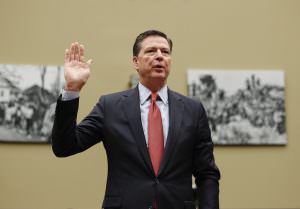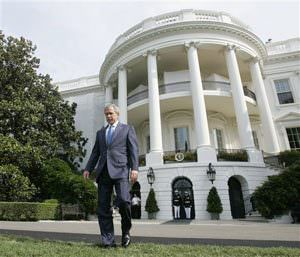Bill Moyers Interviews Jon Stewart
The veteran newsman probes "The Daily Show" host on the state of journalism, his recent showdown with Sen. John McCain and how he finally figured out the Bush administration.
The veteran newsman probes “The Daily Show” host on the state of journalism, his recent showdown with Sen. John McCain and how he finally figured out the Bush administration.
Partial transcript from PBS:
Bill Moyers: Thank you for being with me, Jon Stewart.
Jon Stewart: My absolute pleasure. Welcome back, very excited to see you back on the television.
Moyers: I’m glad to be here, but you know I’m here only because I applied for a job as correspondent on “The Daily Show” and you turned me down.
Stewart: We have standards. Anybody with the kind of journalism experience and professionalism that you have displayed over these years can not work for my program.
Moyers: You’ve said many times, “I don’t want to be a journalist, I’m not a journalist.”
Stewart: And we’re not.
Moyers: But you’re acting like one. You’ve assumed that role. The young people that work with me now, think they get better journalism from you than they do from the Sunday morning talk shows.
Stewart: I can assure them they’re not getting any journalism from us. We are, if anything — I do believe we function as a sort of editorial cartoon. That we are a digestive process, like so many other digestive processes that go on. The thing about, you know, there’s a lot of young people get this and, you know, young people get that from me. People are very sophisticated consumers of information, and they’re pulling all different things.
It’s the same argument people say about the blogs. The blogs are irresponsible. No, they’re not. The blogs are like anything else. You judge each one based on its own veracity and intelligence and all of that. And if you like, you could cherry-pick only the things that you agree with from various things. Or, if you want, you can try and get a broader perspective, or you can find people who are absolutely out of their minds, or find people that are doing incredibly complex and interesting and urgent journalism. And the same goes for our show. It’s a prism into people’s own ideologies, when they watch our program. This is just our take.
Moyers: But it isn’t just you. Sometimes you’ll start a riff, you’ll start down the path of a joke, and it’s about Bush or about Cheney, and the audience will get it. Your live audience will get it, they’ll start applauding even before they know the punch line. And I’m thinking, “OK, they get it. That’s half the country.” What about the other half of the country — are they paying attention? They don’t care, they don’t … they would, they wouldn’t listen to the joke. If they did, they wouldn’t get it?
Stewart: Well, I do you think that sense of humor goes as far as our ideology. I think that ultimately, we have, we have very interesting reactions on our show. People are constantly saying, “I love your … your show is so funny, until you made a joke about global warming, which is a serious issue, and I can’t believe you did that. And I am never watching your show again.” You know, people don’t understand that we’re not warriors in their cause. We’re a group of people that really feel that they want to write jokes about the absurdity that we see in government and the world and all that, and that’s it.
Clip: “The Daily Show”
Stewart: Bush had come mainly to discuss the war spending bill, recently passed by the Democratic Congress, which gives the president all the funding he desires for the troop “surge,” but ties the funding to a definite date for withdrawal of the troops. And you won’t believe what the president thinks of that idea.
President Bush: … Pushing legislation that would undercut our troops just as we’re beginning to make progress in Baghdad.
Stewart: Oooh. We’re just beginning to make it. Oooh, they just pulled the rug to … duh, it’s just happening now! You know, I seem to remember, we’ve been making progress for quite some time now.
Bush: That’s progress. And it’s important progress, and it’s an important part of our strategy to win in Iraq.
Bush: Iraq has made incredible political progress.
Bush: The Iraqis are making inspiring progress.
Bush: Iraq is making incredible political progress.
Bush: I believe we’re making really good progress in Iraq.
Bush: We’re making progress.
Bush: We’re making steady progress.
Bush: We’re making progress. It’s slowly but surely making progress.
Bush: In the battle of Iraq, the United States and our allies have prevailed.
Stewart: Wait a minute! Wait a minute! I figured this out. I know what’s wrong with what we’ve done in Iraq. We’ve been following time as it goes forward. What a classic mistake. Linear time is so pre-9/11.
End clip: “The Daily Show”
Stewart: Yeah, it’s kind of astonishing. There is, I used to have a real disconnect, I think, with the administration. I couldn’t figure out what was going on. I think it’s suddenly become clear to me. They would rather us believe them to be wildly incompetent and inarticulate than to let us know anything about how they operate. And so, they do constitutionally mandated things most of the time, but they don’t — they fulfill the letter of their obligation to checks and balances, but not the intent.
For instance, Alberto Gonzales, and you’ve been watching the hearings. He is either a perjurer, or a low-functioning pinhead. And he allowed himself to be portrayed in those hearings as a low-functioning pinhead, rather than give the congressional committee charged with oversight any information as to his decision-making process at the Department of Justice.
And I used to think, “They’re doing this based on a certain arrogance.” And now, I realize that it’s because they believe there is one accountability moment for a president, and that is the four-year election. And once you get that election, you’re done.
Moyers: They’re right, are they not?
Stewart: They’re completely not right. The election moment is merely the American public saying, “We’d rather you be president than that guy.” That’s it. The next four years, though, you still have to abide by the oversight process that is there to prevent this kind of bizarre, sort of cult-like atmosphere that falls along. … I mean, I accept that kind of veil of secrecy around Tom Cruise and Katie Holmes, but I don’t accept that around our government.
Moyers: Tens of thousands, hundreds of thousands of words were written about Gonzales’ testimony last week in Congress. And I still don’t think a lot of people get it. And all of the sudden, there on “The Daily Show’ that evening, you distilled the essence of it.
Clip: “The Daily Show”
Stewart: So there it was today, the big fight. Gonzalez v. Senate. Are you ready to bumble!
Senator: Who’s idea was this?
Alberto Gonzales: Senator, I don’t recall specifically …
Gonzales: I don’t recall the … the contents.
Gonzales: Senator, I have no recollection.
Gonzales: I … I don’t have any recollection.
Gonzales: I have searched my memory.
Gonzales: I don’t recall remembering …
Gonzales: Senator, I can only testify as to what I recall.
Gonzales: Senator, I don’t recall …
Gonzales: I don’t recall …
Gonzales: I firmly believe that nothing improper occurred.
Stewart: After weeks of mock testimony, there you have it: Alberto Gonzales does not know what happened, but he assures you what he doesn’t remember was handled properly.
End clip: “The Daily Show”
Stewart: And by the way, that was all just — that was a game, and he knew it, and the guys on the committee knew it. And for the president to come out after that and say, “Everything I saw there gave me more confidence in him,” that solidified my notion that, “Oh, it’s because what he expected of Gonzalez was, it’s sort of like, do you remember in ‘Goodfellas’ When Henry Hill got arrested for the first time and Robert De Niro met him at the courthouse and Henry Hill was really upset, because he thought Robert De Niro would be really mad at him. And De Niro comes up to him and he gives him $100 and he goes, “You got pinched. We all get pinched, but you did it right, you didn’t say nothing.”
Moyers: Gonzales said nothing.
Stewart: Right. And “you went up there and said nothing. You gave them no legal recourse against you, and you made yourself, a smart man, a self-made man, look like an utter pinhead on national television, and you did it for me.”
Moyers: How do you explain that the Washington press corps, by and large, particularly the Sunday shows, join the game with them? I mean, you watch those shows …
Stewart: They don’t all, I mean …
Moyers: No, not all of them do, but there’s a kind of wink-wink questioning going on there. You know, I’ll ask the devil’s advocate …
Stewart: Well, it’s because it’s the Harlem Globetrotters playing the Washington Generals. It’s, they’re the only teams playing, and they know they’ve got to play each other every week, and they all have sort of assumed their role. And, I mean, at this point, the government is just, you know, blowing the doors off the media. And not everywhere, and I think, this is where you know, a lot of those blog reporters and all of those things, are bringing a lot of urgency and a lot of momentum to stories that wouldn’t normally carry any momentum.
Moyers: You know, we watched the McCain interview you did this week. Something was going on in that interview that I have not seen in any other interview you’ve done with a political figure. What was going on in your head?
Stewart: In my head?
Moyers: Yeah.
Stewart: Are his arms long enough to connect with me if he comes across the table?
Clip: “The Daily Show”
Stewart: The American people, or at least the ones that I get on the subway with — they know there’s a real threat out there. They felt like Iraq lessened our ability to fight that threat. So when they say that, that’s when I — when they say the talking point is “they’ll follow us home,” they’re trying to follow us home anyway, whether we’re in Iraq or not.
Sen. John McCain: I know that. Look, Bill Russell, a famous philosopher from Boston Celtics once said, “When things go bad, things go bad.” The war was terribly mismanaged … it was terribly mismanaged.
Stewart: But then why not be honest about that? Why attack the people who question … ?
McCain: We are where we are now. We are where we are now. The question is, can we give this strategy a chance? I’m emphasizing a chance to succeed with a great general, and I think …
Stewart: Why should we? Why?
McCain: Because the architects of failure are ignoring this.
Stewart: If the architects that built the house without any doors or windows don’t admit that that’s the house they built and continue to say, “No, it’s your fault for not being able to see into it,” then I don’t understand how we’re supposed to move forward.
End clip: “The Daily Show”
Stewart: I don’t particularly enjoy those types of interviews, because I have a great respect for Sen. McCain, and I hate the idea that our conversation became just two people sort of talking over each other, at one point.
But I, also, in my head, thought, I would love to do an interview where it’s just sort of deconstructed — the talking points of Iraq — sort of the idea of, is this really the conversation we’re having about this war? That if we don’t defeat al-Qaida in Iraq, they’ll follow us home? That to support the troops means not to question that the surge could work. That what we’re really seeing in Iraq is not a terrible war, but in fact, just the media’s portrayal of it. So, I wanted to just go through — like, is this really the conversation that we’re going to be having about something as significant as this war?
Cut to clip: “The Daily Show”
Stewart: They say that asking for a timetable or criticizing the president is not supporting the troops. Explain to me why that is supporting the troops less than extending their tours of duty from 12 months to 15 months, putting them at stop-loss, and not having Walter Reed be up to snuff. How is it? How can the president justify that? How can he have the balls to justify that?
McCain: All I can say is that if you talk to these young men and women who are fighting, they’ll tell you that they think it’s a worthwhile cause, and that they’re fighting for freedom, and they — well, they … all I’m saying … the overwhelming majority of them do. I hear from them all the time.
Stewart: The majority of the guys that I talk to say, “The political scene is not my scene. I’m a soldier.”
McCain: I talk to them all the time, my friend, and I hear from them all the time. They know, I know what war’s like. I know what the scene’s like. And I’m telling you that they believe that they’re fighting for somebody else’s freedom. And the majority of them believe that.
Stewart: I don’t think that …
McCain: You’re entitled to your views. But the view of the majority of them is that feel they’re doing the right thing, and their parents, who have also made sacrifices, generally speaking, and they’re proud of the services of their sons and daughters.
Stewart: No one’s saying that they shouldn’t be proud of their service …
McCain: And I’m proud of them too.
Stewart: Very unfair way to deal with this issue. It certainly is. It certainly is. What’s less supportive of them is — settle down for a second.
McCain: No, you settle down — that they’re fighting in a war that they lost. That’s not fair to them.
Stewart: What I believe is less supportive to the good people who believe they’re fighting a great cause is to not give them a strategy that makes their success possible …
McCain: We now have a strategy.
Stewart: Adding 10,000 people to Baghdad? Add 350,000, then we might have a shot.
McCain: I don’t know that that strategy will succeed, but we do have a new strategy. That’s a fact.
Stewart: All I’m saying is, you cannot look a soldier in the eye and say, “Questioning the president is less supportive to you than extending your tour three months.” You should be coming home to your family.
End clip: “The Daily Show”
Moyers: I saw McCain shrivel. I mean, he’s been on your show …
Stewart: He didn’t believe me. I think anybody who’s been in a POW camp for five years can– take eight minutes on “The Daily Show.”
Moyers: But something happened. You saw it happen to him. What you saw was evasive action. It wasn’t shriveling, it was merely …
Moyers: But he dropped his head, and you could, you could …
Stewart: Actually, he — began to, he stopped connecting and just looked at my chest and decided, “I’m just gonna continue to talk about honor and duty and the families should be proud,” all the things that are cudgels emotionally to keep us from the conversation. But things that weren’t relevant to what we were talking about.
Moyers: So many people seem to want just what you did, somebody to cut through the talking points and get our politicians to talk candidly and frankly. … And I know you …
Stewart: Not that many people. You’ve seen our ratings. Some people want it. A couple of people download it from iTunes.
Click here for more.
Your support matters…Independent journalism is under threat and overshadowed by heavily funded mainstream media.
You can help level the playing field. Become a member.
Your tax-deductible contribution keeps us digging beneath the headlines to give you thought-provoking, investigative reporting and analysis that unearths what's really happening- without compromise.
Give today to support our courageous, independent journalists.






You need to be a supporter to comment.
There are currently no responses to this article.
Be the first to respond.